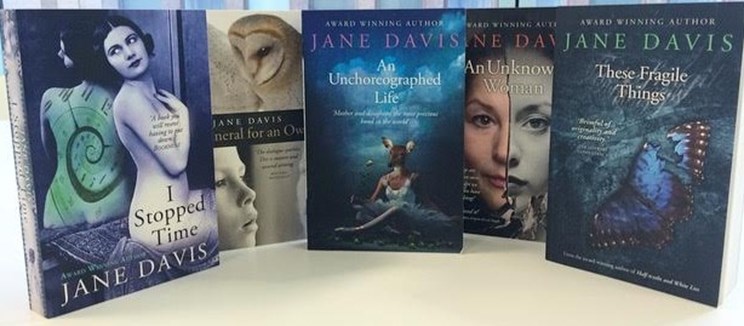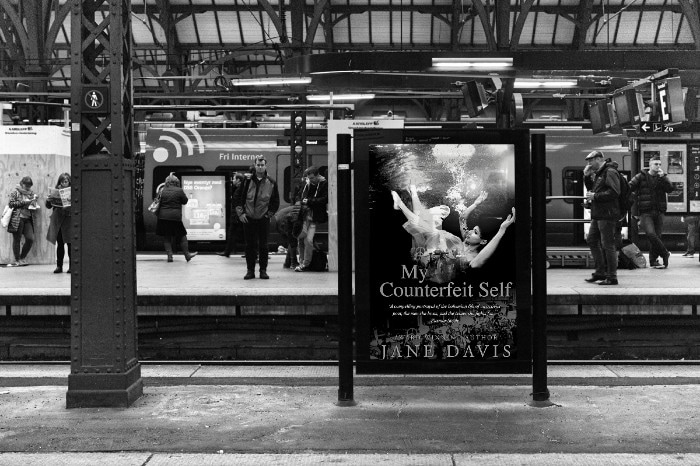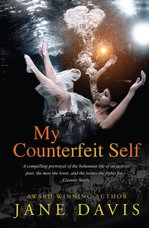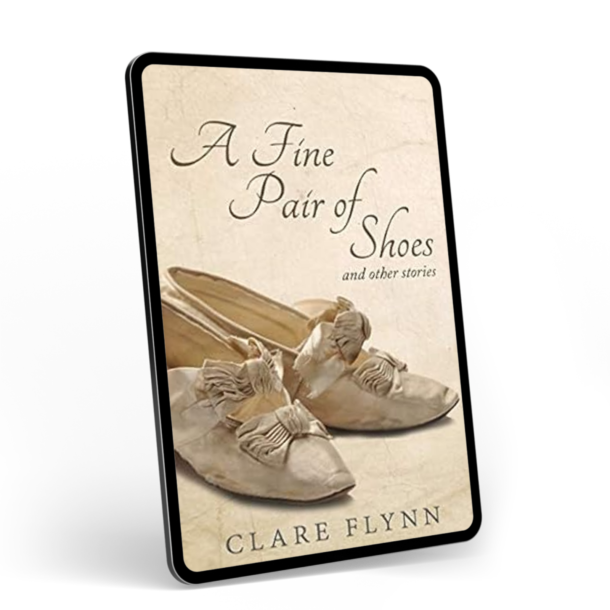I’m delighted to welcome author, Jane Davis onto the blog today to answer my questions about her writing life. Jane is the author of seven acclaimed novels and is a former winner of The Daily Mail First Novel Award for Half-truths and White Lies which was described by Joanne Harris as ‘A story of secrets, lies, grief and, ultimately, redemption, charmingly handled by this very promising new writer.’ The Bookseller featured her in their ‘One to Watch’ section.
Tell me about yourself – where do you live and what do you do when you’re not writing?
I live in Carshalton, Surrey, with my Formula 1 obsessed, beer-brewing partner, surrounded by growing piles of paperbacks, CDs and general chaos. We have sunk a small fortune into restoring our quirky old house. It was originally the ticket office for what was, until the 1920s, a pleasure gardens, complete with a boating lake. We have a photograph hanging in our hall of Edwardian ladies in glorious white dresses playing tennis in what is now the middle of the road.
As for what I do when I’m not writing… when I can get away, you may spot me disappearing up the side of a mountain with a camera in hand. But walking is also part of my daily routine. I often find that I think better when I’m on the move.

Give me a brief picture of your personal journey as a writer?
A graphic that regularly does the rounds that’s made up of two graphs. The first goes under the caption, ‘what you think your career will look like’ and it’s upwards all the way. The caption for the second is ‘what it will actually look like.’ A roller-coaster. That is my experience of writing.
Something happened in my life when I hit my mid-thirties that I needed to make sense of. I used writing to explore how I felt about it. I think that most writers are trying to create order in a confused world. I had never been to a creative writing class. I just had a laptop and a little spare time.
My first attempt at writing a novel didn’t make it as far as being a book, but it did earn me the services of a literary agent and the words, ‘Jane, you are a writer’, which sounded far more glamorous than ‘Jane, you are an insurance broker’. There was a draft contract from a small publisher, but before the ink could dry, the small publisher was eaten up by a big publisher.
My second novel won the Daily Mail First Novel Award. I was going to be the next Joanne Harris. But a couple of months after publication of Half-truths and White Lies, Transworld rejected my follow-up. It was beautifully written, but it wasn’t ‘women’s fiction’. There was no point arguing that I hadn’t set out to write women’s fiction. No meant no.
I carried on submitting manuscripts. One had already won an award for its opening chapter. Surely two awards would open doors? By 2012, I felt like the writer in Michael Chabon’s Wonder Boys who attends the same conference year after year with a different edit of the same novel. A novel which continues to be rejected, albeit for slightly different reasons.
There was another path, but I’d been resisting it. I didn’t explore self-publishing until I attended a conference at the tail-end of 2012. I’d believed the line I had been sold that self-publishing wasn’t something a self-respecting author who wanted a long-term career should consider. But I was excited by what I saw. Established authors who’d been dropped by publishers were rubbing shoulders with novices who had priced their e-Books at 99p, and sold 100,000 copies within a year. This was a revolution! Was I out or was I in?
I decided I was in. Though I made rookie mistakes, reviews were positive. The next time, I did better. I grew my team of professionals. I now have self-published six titles under my own imprint. My fifth, An Unknown Woman, won Writing Magazine’s Self-published Book of the Year Award 2016 and was shortlisted for a second award, which was also open to traditionally published books.
How do you feed your creative engine? Where do you look, or what do you do, to keep the inspiration flowing?
Anything and everything inspires me. A news article. A conversation I’ve overheard. A piece of music. An observation. A nagging doubt. An inscription on a gravestone or a park bench. A recurring nightmare. Something from my past that I won’t leave me alone.
I haven’t moved far from the area where I grew up – Wimbledon, known for its association with tennis. These days, it’s one of London’s most expensive post codes, but back in those pre-DIY days, it wasn’t nearly so affluent. The changes I’ve seen, both demographically and architecturally, interest me. There are no expensive research trips for me. My novels are deeply entrenched in my personal geography, which already has many strata. I’ll let Ron explain. (Taken from An Unknown Woman)
‘There was something transportative about living in the same city all of your life; walking around familiar geography, knee-deep in the history of the place. And superimposed over a street map carried both inside and outside his head (the then and the now), were the milestones of his own life.’
But when you write characters into what is already your personal backdrop, you create yet another layer. Recently, I found myself in St Mary’s Church in Beddington lighting a candle on my mother-in-law’s anniversary, but I also felt the presence of Jim and Aimee, two of my characters from A Funeral for an Owl.
I think you always have to make it personal. The house that I burn down in the opening scene of An Unknown Woman isn’t invented. It’s mine. I imagined standing in the road, watching the destruction of everything I own. For my latest release, I drew on my experience as a writer.

Tell me about your latest book and why we should all buy it?
My Counterfeit Self tells the story of a radical poet and political activist called Lucy Forrester, who’s a cross between Edith Sitwell and Vivienne Westwood. Having been anti-establishment all of her life, she’s horrified to find that she’s been featured on the Queen’s New Year’s Honours list.
The first chapter arrived almost intact. I could picture Lucy standing in the middle of her rose garden, dressed for the funeral of her literary critic and on/off lover of the past fifty years, secateurs in one hand, the letter from the palace in the other. I was fascinated to find out who she was and what had made her that way.
People have asked me, Why a poet? To be completely honest, the idea of writing about the life of a poet came directly from reader reviews. Several comments that my prose was like poetry. I had no idea if I could actually write poetry but this gave me confidence that I might be able to convince readers that I could see the world as a poet does. I think I managed to pull it off.
Why should you buy it? Buy it if you like moral dilemmas. Buy it if you’re fascinated by the recent past. Buy it if you’ve ever seen an eccentric-looking older lady and thought, I bet she’s lived!
Mark Twain said “Most writers regard the truth as their most valuable possession, and therefore are most economical in its use.” – How much of your own fiction is based on truth?
I have three rules when writing. Whatever my subject-matter, the end-product must be honest, credible and authentic, so facts are very important to me. I want readers to believe that Lucy Forrester exists! At the same time, I didn’t expect a reader to contact me and tell me that I’d written her biography. How could this have happened?
When I was writing I Stopped Time, a novel that spanned an entire century, I set up timelines, adding everything from news stories to the books people were reading to the weather. Now, whenever I write a book, I grab the data from the decades it covers and slot my tailored research into place. For My Counterfeit Self, that included details from biographies of poets, literary critics, and a dress designer who had connections with the music world.
I knew that Lucy was going to have suffered a severe childhood illness. When I laid my story over the timeline, there was only one real choice. During the 1940s and 1950s, polio was the world’s most feared disease, paralysing or killing half a million people a year.
Lucy was also going to be my rebel with a cause, but what cause should I give her? Again, there was only one logical choice. Fear of the Nuclear Bomb was a hangover from her wartime childhood. Talk of a third world war – the war to end all wars – permeated her adolescence. Watching black and white footage of Rod Stewart taking part in the first of the CND march from Trafalgar Square to Aldermaston, I had no trouble imagining Lucy Forrester at the centre of it all. And, of course, if you’ve campaigned for CND your entire adult life, it seems natural that you would take up the cause of the atomic veterans when their plight was highlighted.
When her parents behaved appallingly (and, here, I borrowed an episode from a biography, because you can’t make this stuff up), freed from the expectations of her family, Lucy decamps to bohemian Soho. And this is where my beta readers gave invaluable encouragement and insight. Several had lived the life I was describing. Marrying your gay best friend certainly wasn’t unusual in the 50s and 60s.
Put like that and it makes sense. Perhaps if you’ve done your research correctly, the life that you create may already have been taken.
What comes first –location, plot, characters?
For me, it’s always the characters. Understand them, and they’ll do the leg work for you.
I never write an outline. I’m a gradual layer-er. I like George R R Martin’s quote: ‘I’ve always said there are two kinds of writers. There are architects and gardeners. Architects do blueprints before they drive the first nail, they design the entire house, where the pipes are running and how many rooms there are going to be, how high the roof will be. But the gardeners just dig a hole and plant the seed and see what comes up.’ Personally, I think there are more than two types of writers. I want to be Mary Anning scouring the beaches at Lyme Regis for dinosaur fossils, or Howard Carter discovering the tomb of Tutankhamun, or metal detectorist Terry Herbert digging up the Staffordshire Hoard. What I don’t want to be is a parent deciding on my child’s future, telling my children which subjects to study, arranging my daughter’s marriage.
Tell me about your writing day. Do you work to a routine? Do you have a dedicated space to write in? Endless cups of coffee or tea?
I’d love to say that I’m really good at ring-fencing my writing time. The reality is that I do whatever is most urgent (sometimes that’s going out and earning money), otherwise I’ll have something nagging away while I’m trying to write. A writer only has the luxury of focusing on the next book when they’re unpublished. As soon book 1 is out there, a mountain of tasks descend. Marketing, promotion, blogging, maintaining a presence on social media, the 350 emails that arrive in your inbox every day – not to mention the day job. It’s all too easy to get to the end of a fourteen-hour day and find that you haven’t touched your work in progress. 2000 words a day is not undoable, but 1000 words l results in a novel over the space of a year.
As for my desk, it’s the dining room table. At least, I think the dining room table’s under here somewhere. It’s littered with notes written on the backs of envelopes, Sellotape, my diary, a calculator. I can work in chaos – so long as I have silence. Silence and coffee. You’re right to mention that.
Whatever else does or doesn’t happen, my day starts and ends with reading. It’s part of a writer’s job to nourish themselves with the best fiction they can lay their hands on.
Anthony Burgess once said “Literature is all, or mostly, about sex”. How true is that of your books?
I had one of my characters say in my first (unpublished) book that sex and religion are the two great subjects in life. Let’s face it, the human race wouldn’t be here today if sex wasn’t the driving force that it is. The logic of the quote is that literature must reflect life, but let me be upfront: I’m totally squeamish about writing sex scenes. Having made that confession, it might then seem odd that I chose to write An Unchoreographed Life, in which one of my two main characters is a sex-worker. But my focus is always relationships. I’m far more likely to leave readers at the bedroom door or, if I allow readers a glimpse inside the bedroom, I’ll opt to show a tender moment between characters.
Who or what has been the greatest help to you as a writer?
Since I self-published, I’ve been overwhelmed by the generosity of the self-publishing community. I’ve learned such a lot from other authors.
I wish I could say that I have learnt how to write slick interview answers from J J Marsh, but you have the evidence in front of you!
Mel Sherratt reminded me that that you can’t be in the right place at the right time unless you stick at something. (She was heralded an overnight success, after she’d been slogging away for fifteen years).
As a result of interviewing Linda Gillard, I have explored how to market myself, rather than my books, as a brand.
I’ve mentioned my fabulous group of beta readers who road test my novels and give me their invaluable feedback.
But, most of all, through interviewing other authors, I have learned that there is no one way of writing a novel. You discover what works best for you through trial and error.
What has been the hardest thing for you to overcome in becoming an author?
The constant cycle of self-doubt. In fact, I’m not sure you ever overcome it. Joanna Penn’s post about this received a huge number of comments and is well worth a read.
If you could pick one of your own characters to spend some time with, who would it be and why?
I spent eighteen months with Lucy Forrester but I really do find her fascinating. She would certainly make a fantastic dinner party guest. She’d dress the part then make absolutely no effort to live up to other people’s expectations of how she would behave. But, boy, would she have a story or two!
What are you working on now – or next?
I’m quite superstitious about talking about a book before the first draft is complete. I will say that it’s born out of two things. Firstly, it was my reaction to seeing the result of the second Hillsborough inquest. While watching the celebrations, my reaction was, How can those people possibly go back to what we think of as a normal life? And secondly, it’s about one of my greatest fears. Show me a mountain and I’ll happily climb it, but escalators – they give me terrible vertigo.
 Thanks, Jane, I’m looking forward to reading My Counterfeit Self
Thanks, Jane, I’m looking forward to reading My Counterfeit Self
Find out more about Jane Davis from her website where you can sign up to her mailing list and receive a free ebook of her novel I Stopped Time. You can also link up with her there on all her social media pages.
Find and buy all Jane’s books via her author page on Amazon
Clare Flynn is the author of A Greater World, Kurinji FLowers, Letters from a Patchwork Quilt and The Green Ribbons. Her fifth novel, The Chalky Sea will be published in 2017


0 Comments